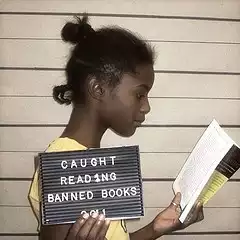
I remember the first time I heard a book was “banned.” I was most likely in fifth grade, left with the librarian to keep an eye on me while I studied and did homework in my little town library on a Saturday afternoon. Stanley Kubrick’s movie, “Lolita” had been in the news over the summer. I wasn’t allowed to see it. “Not for children,” my parents pronounced. I figured I’d go looking for the book at the library and see what all the hubbub was about.
So I looked in the card catalog (please pardon me while I show my age), and found the author, Nabokov. Then I waited for the best opportunity to sidle inconspicuously over to the grownup fiction section. Surprise to me – the book wasn’t on the shelf where it should have been. Was it checked out? I worked up my nerve and asked the librarian.
Normally, and retrospectively I now see, with wonderful guidance, this woman always encouraged me to select books from the adult fiction section. This time, when I asked about “Lolita,” she frowned. “I have that book behind the desk. It’s been banned in other libraries, but here adults must ask to borrow it.”
Clearly, not being an adult, I was not allowed to read the book OR see the movie. End of story. “Wait until you are older.”
Was I angry about banned books? On a personal level, you bet. And the idea that books could be challenged and removed from library and school shelves was hatched in my brain. “What other books are banned like this?” I wondered. (Did I manage to get my hands on a copy of “Lolita”? It took a couple of years, but I’d read it before I finished middle school).
Flash forward to 2014, Sept. 21 through Sept. 27. Banned Books Week is an annual happening, a time when the entire book community celebrates the freedom to read and highlights the value of free and open access to information.
Click through for a great list of movies based on banned books, Watching Banned Books: Movies and TV from ALA’s Banned and Challenged Booklists. Some titles are on DVD to borrow from our collection, others are available online through our hoopla and Films on Demand eLibrary databases.
Photo courtesy of Oak Park Public Library on FLICKR
